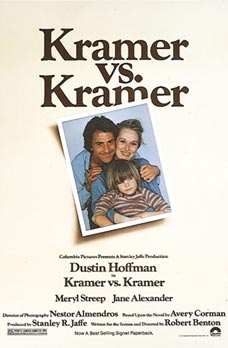After the huge success of The Graduate, Dustin Hoffman put together a string of movies that are among the best that came out of the 1970s, movies like All the President's Men, Marathon Man, Papillon, Straw Dogs, and Little Big Man. But his best part from the decade came in 1979 in a performance that won him his first Academy Award as a single dad in Kramer vs. Kramer.
Coming home with great news from work, he's been given the biggest account the company holds, Ted Kramer (Hoffman) bursts through the door to tell his wife only to almost miss his wife's news. Joanna (Meryl Streep) has had enough of their marriage, doesn't think she's a good mother to 7-year old Billy (Justin Henry), and generally is in a bad place. She tells a completely baffled Ted that she's leaving him and Billy.
So with no way to stop her, Ted now becomes a single dad who has to raise his son, keep the apartment going, and also hold down a job where he's been given huge responsibilities. But after some early struggles, Ted and Billy get into a rhythm. They get up, eat breakfast together, and then Ted walks him to school each morning. At night, he picks him up at school and they do homework, play, read together. After almost 18 months of their new life, a problem arises, Joanna is back and wants custody of her boy. A custody battle ensues where all the dirty laundry comes out in the wash.
Should Joanna be given custody solely because she's the boy's mother even though she abandoned Billy? Or should Ted be given the benefit of the doubt since he's cared for Billy on his own for the last year and a half? The custody battle in court is a difficult section of the movie to watch because neither parent truly wants to rip the other one to shreds on the stand, but at the same time they both know it's what needs to happen if they hope to get custody of Billy. The decision the judge settles on doesn't make sense at all, but with the ending, everyone comes to their senses. And thank God for it, because I would have been pissed if the decision had stuck.
As two of their generations best actors, Hoffman and Streep both won Oscars for their performances. Streep disappears for much of the movie after she leaves her family so it's Hoffman's movie to carry. He doesn't disappoint, transforming into a father who knows every little thing about his son after only being partially involved in the boy's life for several years because of the work his job entails. Two scenes illustrate this change in a criminally simple fashion. The morning after Joanna leaves Ted scrambles to make Billy some french toast for breakfast. Without the gory details, let's say it doesn't go smoothly. Flash to 18 months later where Ted and Billy have it down to an art, the breakfast is made smooth with no incidents. It's a great way to illustrate the change the father and son have gone through.
While Hoffman and Streep were both nominated and won Oscars for their performances, 8-year old Justin Henry was only nominated for his part. Nowadays where child actors range from god awful to 'keep an eye on them in the future,' Henry is one of the most natural kids in a movie I've come across. He acts like a kid, talks like a kid, and comes across as completely believable. His interactions with Hoffman especially, Streep too though, bring the movie up a notch because I believed they were a family. Too bad he didn't win the Oscar because he fully deserved it.
As a mother torn about what to do with her life, Streep is only around for half the movie but leaves a lasting impression. She's trying to get her life in order at the cost of abandoning her son. Her decision to return shows Joanna realizes she made a mistake, but is too late for her? Here's her testimony at the custody hearing, SPOILERS. Out of the supporting cast, Jane Alexander has a good part as Margaret, a single mom who lives one floor down from the Kramers in their apartment building. She was Joanna's friend but becomes Ted's best friend after his wife leaves, the two bonding through their similar backgrounds.
Made in 1979, the movie has the look of a documentary. No crazy shots, no in your face filming, director Robert Benton just points the camera at the story and let's them go. As a viewer, you feel like a fly on the wall watching the Kramer family interact. It's a movie that almost swept its way through the Oscars, and for good reason. Kramer vs. Kramer can be a heartbreaking story but one with an ending that fits so perfectly.


No comments:
Post a Comment